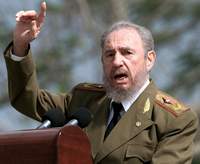No changes in the pipeline for Cuba as Castro’s health improves
It would be very interesting to take a closer look at Cuba while analyzing the impact of internal and external changes on the fate of a country. The situation in the so-called Island of Liberty has remained mostly unchanged for decades. It is worthy of notice that countries which always opposed Castro’s regime, those which are far more powerful than Cuba – they seem to have learned to accept the consistency of Havana politics. For instance, last week the European Union was reported to be mulling over the lifting of sanctions imposed on Cuba a long time ago.

The news about Fidel Castro’s grave illness made headlines all over the world about a year ago. The international community was quick to speculate on what changes might happen to Cuba after the potential demise of the Cuban leader. However, no political earthquake has taken place in Cuba so far. Moreover, Castro is reported to be on the way to total recovery. In a series of his editorials published by the Cuban central daily Granma, Castro admitted that he had hovered between life and death in the last several months. According to estimates made public by Bolivian President Morales, Castro’s big friend, the Cuban leader has undergone surgery for about ten times. These days even the Western journalists believe that Castro’s health was improving. In the light of recent news, it is highly unlikely that any radical political changes will occur in Cuba in the near future. On the contrary, the status of Cuba at the international scene became stronger. The recently formed UN Human Rights Council decided last week to delete Cuba from the list of countries whose human rights records should be closely watched by the international community.
The UN Human Rights Council was created to substitute for the UN Commission on Human Rights. It is ostensibly designed to take a tougher stand on human rights abuses committed by UN member states. Predictably enough, the United States was particularly enraged by the decision made by Human Rights Council with regard to Cuba. Congresswoman (Rep.) from Florida Ileana Ros-Letinen threatened to propose a bill which would prevent the United States from funding the Human Rights Council. Meanwhile, the EU started to gauge the possibility of reestablishing diplomatic relations with Cuba. Spain will in all probability to mediate a dialogue between Brussels and Havana. However, some brand-new member states of the EU are obviously opposed to the plan. They could not but make a fuss over the issue. The leaders of Czech Republic rule out even the slightest prospect of improving relations between the West and a communist state. They seem to be doing their utmost trying to emphasize the importance of democracy and human rights for the benefit of their Western neighbors. No doubt about it, the decisive congresswoman from Miami should admire this sort of adherence to one’s principles…
In his turn, a convalescent Castro stays focused on the importance of an ideological polemic against his northern archenemy. The Cuban leader recently called for strengthening the nation’s defensive capability by any means possible including development of newest weaponry. It is understood that Cuba, a Latin American island state, can hardly compete against U.S. or Russia in terms of defense industry. On the other hand, the Cubans are hard to beat when it comes to patriotism and determination.
Everything comes to an end sooner or later. Wilma Espin, the wife of Castro’s younger brother Raul, passed away last week. Raul is currently serving as acting president. Fidel Castro is 80 years old. Someday he will be gone too. Even when Cuba’s fist president is no more, freedom of their country will be a top priority for the majority of Cubans, those who got used to paying little attention to hardships, those who are proud of their independence.
Politcom
Translated by Guerman Grachev
Pravda.ru
Subscribe to Pravda.Ru Telegram channel, Facebook, RSS!


